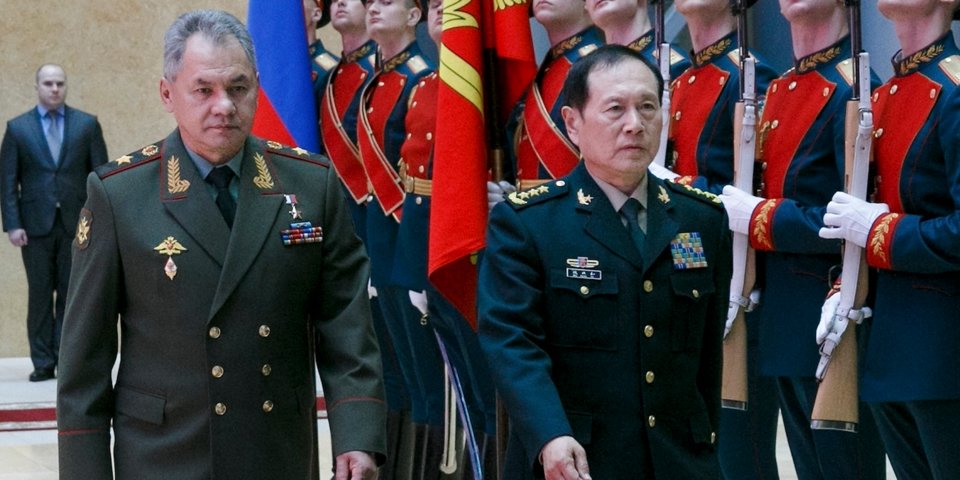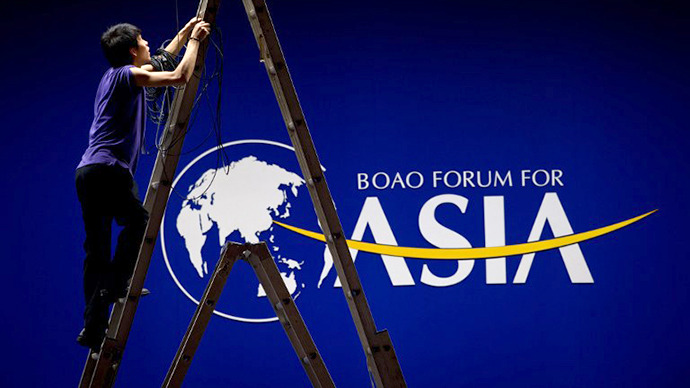
 China and Russia Pledge Military Cooperation in a Signal to the United States
China and Russia Pledge Military Cooperation in a Signal to the United StatesAt an annual security conference in Russia this week, Chinese and Russian officials pledged closer cooperation between the Chinese and Russian militaries. In a bold message to the U.S., China's new defense minister General Wei Fenghe said that his attendance at the conference was a signal to "let the Americans know about the close ties between the armed forces of China and Russia." It was General Wei's first overseas trip since he assumed the positions of state councilor and defense minister of China in March.
The event, titled the Moscow Conference on International Security, took place amidst ongoing tensions between Russia and many Western countries over Russia's alleged poisoning of a former Russian spy in Britain just over a month ago. Despite widespread international criticism of Russia, the event was attended by delegations from over 90 countries. It featured presentations on security situations in the Middle East, Africa, Latin America and Asia.
Chinese Foreign Minister Wang Yi was also in Russia this week, reportedly to brief Russian counterparts on the recent visit of Kim Jong Un to Beijing. In a press conference held after his meeting with Russian Foreign Minister Sergei Lavrov, Wang said that the relationship between China and Russia was at "the best level in history." After several months of increasing trade tensions between China and the U.S. and harsh rhetoric from the Trump administration including naming China a strategic competitor and possible national security threat to the United States in the National Security Strategy and Nuclear Posture Review, commentators have begun to question whether the U.S. may be driving China towards Russia. In an article for the National Bureau of Asian Research released yesterday, prominent American diplomat J. Stapleton Roy wrote, "U.S. policies have at times inadvertently driven China and Russia closer together, to the detriment of U.S. interests. Policymakers should neither exaggerate the degree of convergence between Chinese and Russian interests nor ignore the significant factors that underlie their cooperation. Skillful U.S. diplomacy can moderate the adverse impact of Sino-Russian solidarity."
In an article for China-US Focus this week, Yu Sui wrote, "China-U.S. relations do not depend on Russia-U.S. relations but the latter does influence the former. . . If the American authorities still view Russia and China as targets to attack, 'punching others with two fists' will only bring the U.S. into a more awkward position."
 If and When Further Trade Tariffs Are Implemented...
If and When Further Trade Tariffs Are Implemented...The term "trade war" has been used frequently to describe the dramatic increase in tensions in China-U.S. trade relations since January. Catalyzed by President Trump's steel and aluminum tariffs, the back and forth of tariffs have both American and Chinese businesses and consumers on edge. This week, President Trump threatened an additional $100 billion worth of new tariffs on Chinese imports, which sent the stock market into a plunge. China has released its own list of products to be targeted with duties if the U.S. administration gives the go ahead with the hefty tariff package. The Chinese list primarily focuses on agricultural products, but also includes automobiles, chemicals and aircraft.
Although the implementation date for both countries' tariffs remains unclear, industries on both sides are bracing for a damaging blow to the global economy. One industry that could face immediate consequences is the shipping and logistics industry. According to CNN Money, "tariffs could put up to 7 percent of Asia-to-U.S. shipping at risk and impact 1 percent of total global shipping. . .Shipping revenue in 2017 totaled $210 billion."
Jack Cutts, senior director of business research at the Consumer Technology Association, warned that, "there's potential that this could be a major hit to the pocketbooks of Americans, based on what we're seeing right now." Former Treasury Department official Christine McDaniel believes, "U.S. consumers have more to lose than Chinese consumers." This has many wondering what there is to gain from getting involved in a trade war with China.
This week, China-US Focus contributor Lucio Blanco Pitlo III wrote, "the gains for the U.S. from this tariff imposition are debatable and are unlikely to address the root cause of the trade imbalance, which is structural. Market forces profess no national affinities and investors will go where they can maximize their profits: American companies are no exception." If and when the tariffs are implemented, Chinese and Americans alike will feel the consequences.
 President Xi May Announce New Reforms in his Boao Forum Keynote
President Xi May Announce New Reforms in his Boao Forum KeynoteStarting this Sunday, the island of Hainan, China will be the meeting point for heads of state, business leaders, and other prominent individuals attending an annual international conference on Asian development called the Boao Forum for Asia. Since 2002, the conference has been a platform for the leaders of Asian countries to discuss trade and economic cooperation between Asia and other parts of the world. In recent years, the event has drawn increasing international attention as China has taken on a more prominent global leadership role. As well as heads of state, UN Secretary General Antonio Guterres and Christine Lagarde, the Managing Director of the International Monetary Fund, are expected to attend.
President Xi will be delivering the keynote speech at the opening ceremony of the forum. On Tuesday, Foreign Minister Wang Yi said that Xi would use the keynote to announce "new measures to expand reform and opening-up." One of the major announcements may be the establishment of free-trade ports which would "apply international standards to ensure the free flow of goods, human resources, capital and investment, and be supported by new rules and regulations," a source quoted by the South China Morning Post said. A former Chinese vice-minister of commerce, Wei Jianguo, said that Xi may also announce measures to help Beijing battle U.S. trade protectionism.
In a climate of trade tensions, President Xi is likely to consider the forum an important opportunity to promote regional cooperation in Asia and China's idea of a community with a shared future for mankind.
 New Conversation Format Launched on China-US Focus
New Conversation Format Launched on China-US FocusAt this year's World Economic Forum in Davos, Vice Premier Liu He said that China's new opening up and reform policies would "exceed the expectations of the international community." Are new policies on reform, expected to be implemented starting this year, likely to meet or exceed international expectations? Six American and Chinese scholars tackle this question in the first iteration of China-US Focus' new conversation format, Quick Focus, which will encourage multi-faceted conversations between our network of scholars.
"American and European businesses and academics should work with China, and encourage and help China in further reform and opening up," He Weiwen, a Senior Fellow at the Center for China and Globalization, wrote. "Tremendous efforts need to be made to ensure greater market access, equal national treatment. . .increase transparency and rule by law."
Christopher McNally, a Senior Fellow at the East-West Center, argued that market openings, even if substantial, "will occur in sectors where Chinese domestic competitors have had time to establish themselves. . .Compared to an earlier era of reform and opening, foreign investors will face massive competitive pressures."
Read the rest of the responses on our new Quick Focus conversation platform.
Prepared by China-US Focus editorial teams in Hong Kong and New York, this weekly newsletter offers you snap shots of latest trends and developments emerging from China every week, while adding a dose of historical perspective.
- 2018-03-30 Kim Jong Un Visits Beijing on First Overseas Visit
- 2018-03-23 President Trump Asks for Tariffs on Around $50 Billion Worth of Chinese Imports
- 2018-03-16 Tillerson to be Replaced by Mike Pompeo as Secretary of State
- 2018-03-09 President Trump Agrees to Meet Kim Jong-Un
- 2018-03-02 U.S. Imposes Tariffs on Chinese Aluminum
- 2018-02-23 A Week of Developments Related to North Korea
- 2018-02-16 Cui Tiankai says U.S. Should Not Advocate Confrontational Strategy Towards China
- 2018-02-09 China Releases the “No.1 Central Document” Containing New Rural Policies
- 2018-02-02 Wang Qishan Appointed to the National Legislature
- 2018-01-26 New Edition of the Focus Digest
- 2018-01-19 South Korea and North Korea to Compete Together at the Winter Olympics
- 2018-01-12 U.S. House of Representatives Passes Taiwan Bills
- 2018-01-05 U.S. Rejects Sale of Moneygram to China’s Ant Financial
- 2017-12-22 Trump’s National Security Strategy Labels China a “Revisionist Power”
- 2017-12-15 White House and Secretary of State contradict each other on North Korea talks
- 2017-12-08 China Boasts its Technology Chops at the 4th Annual World Internet Conference
- 2017-12-01 The Future of the China-US Economic Relationship
- 2017-11-17 The “Indo Pacific”: A New American Strategy for Asia?
- 2017-11-10 President Trump Revels in China’s State-Visit Red Carpet Treatment